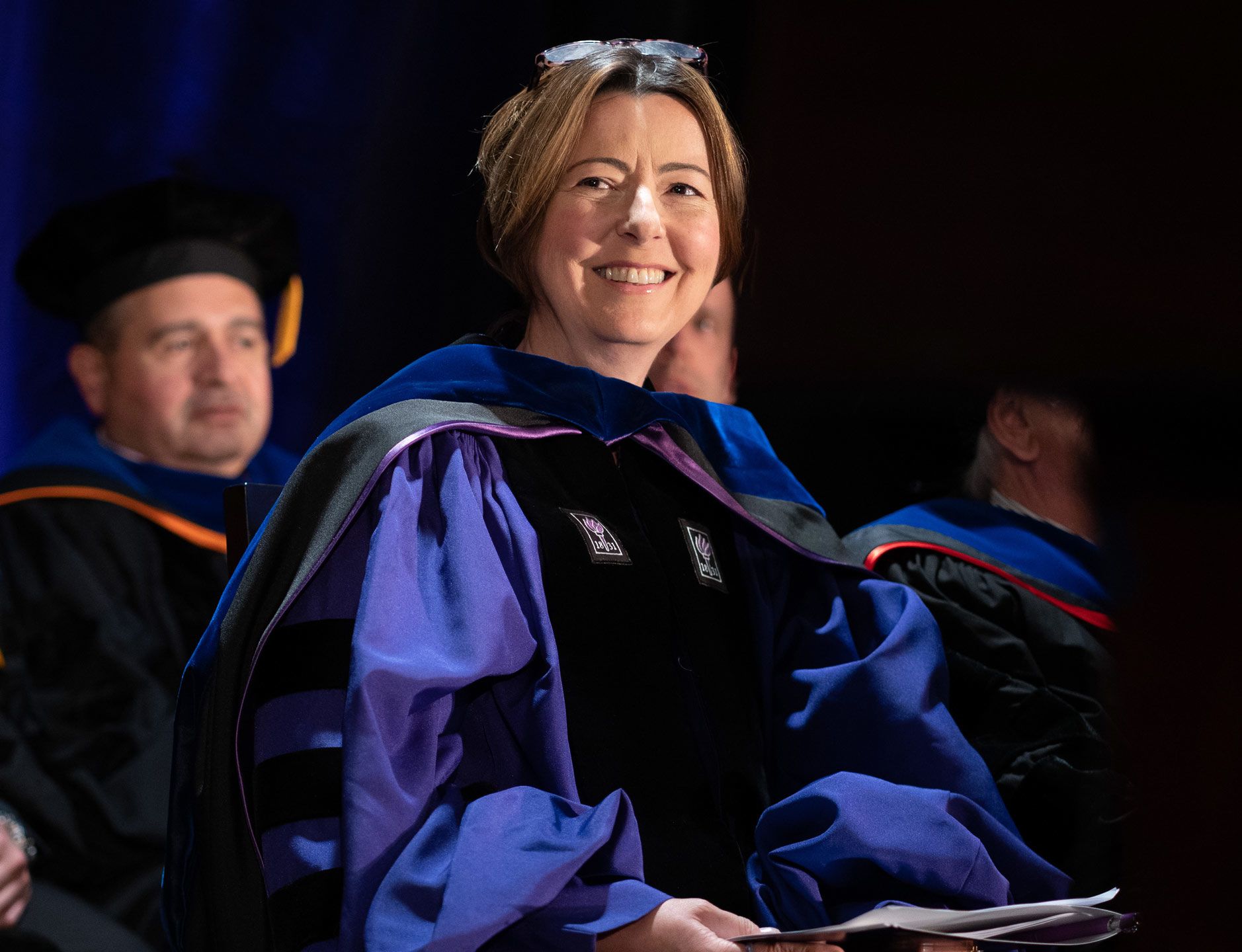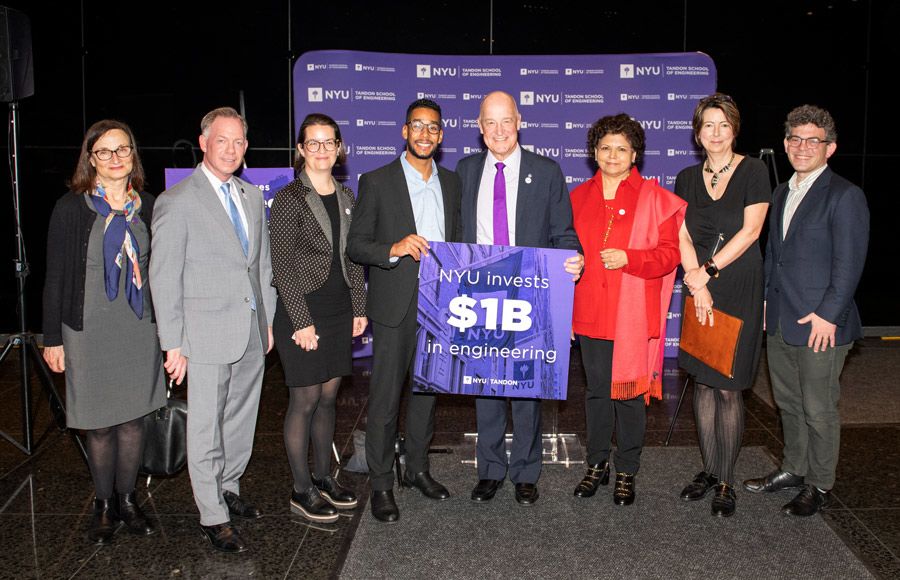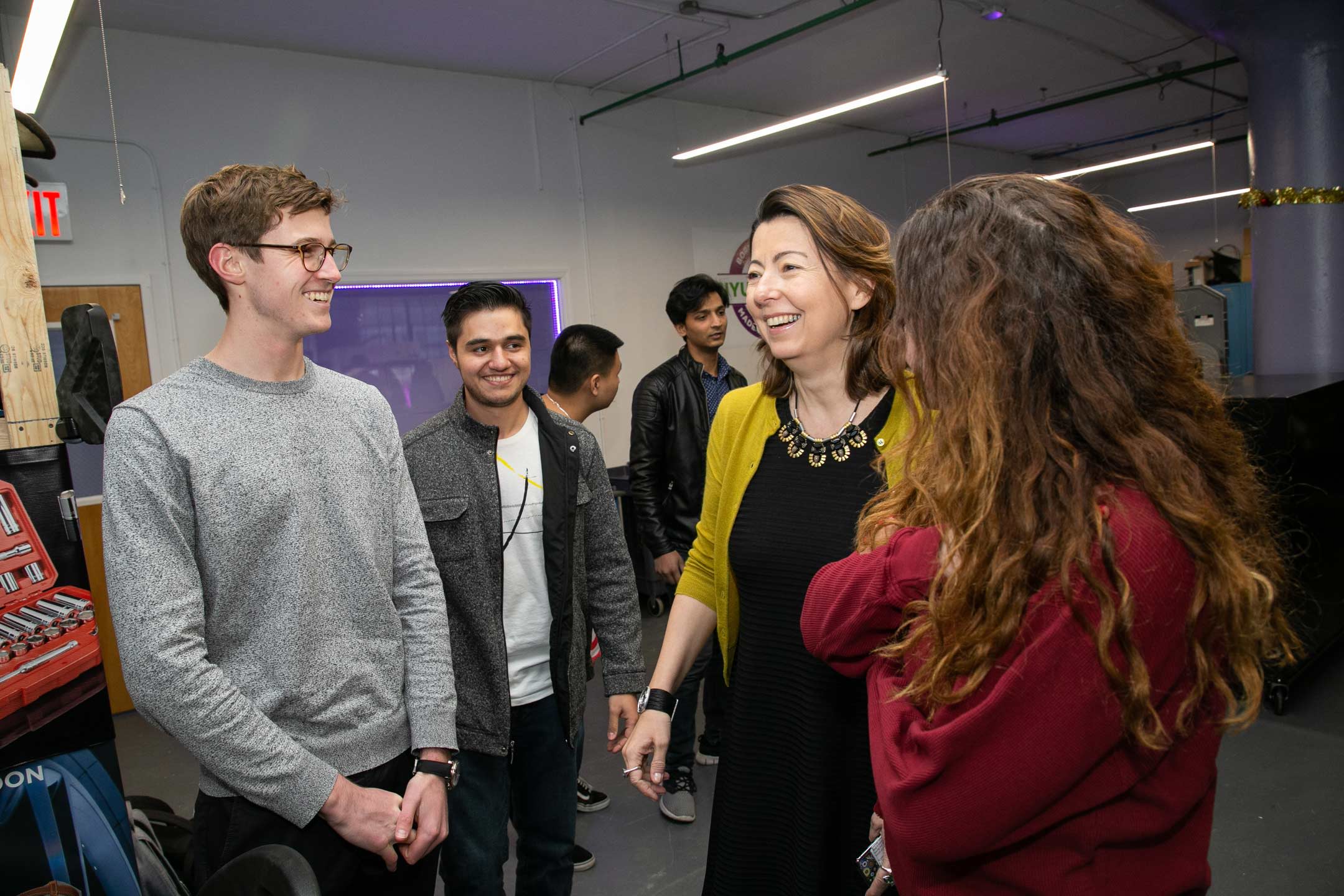A departing NYU Dean reflects on six years of her leadership
Jelena Kovačević prepares to transition from the role of dean of New York University Tandon School of Engineering. In this interview, she looks back at the school’s tremendous progress and offers advice to the next generation of university leaders.

As an undergraduate in the former Yugoslavia, Jelena Kovačević developed a lifelong fascination with New York City.
One of her favorite engineering textbooks was authored by a renowned professor at the former Polytechnic University in Brooklyn. When Kovačević came to the United States for her graduate studies, she selected Columbia University in large part for its location. After serving as a professor and head of the Department of Electrical and Computer Engineering at Carnegie Mellon University, Kovačević in 2018 became the first woman Dean at the New York University Tandon School of Engineering, which had been formed from a merger with Polytechnic University.
As technology has become even more central to our lives, Kovačević has helped build a pre-eminent engineering school to help meet those challenges. NYU Tandon during her tenure has continued to vault through the college rankings. It has recorded significant increases in applications and research funding. In 2022, NYU announced a long-term investment of $1 billion to expand and modernize the school’s Downtown Brooklyn campus and recruit 40 new full-time tenure-track faculty.
As she prepares to transition from this role next summer, Kovačević reflects on her tenure as dean and offers some guidance for new university administrators.
Dean Kovačević discusses the evolution of machine learning and advice for up-and-coming engineers in honor of receiving a 2022 IEEE Engineering in Medicine & Biology Society Career Achievement Award for pioneering academic leadership in biomedical imaging research & education. Credit: NYU Tandon on YouTube
When you became Dean of NYU Tandon, what were your marching orders?
Brooklyn Poly was recognized around the world as a top engineering school with renowned faculty. Then it hit a hard time financially, and it fell reputationally because it didn’t have money and faculty were leaving. The merger with NYU was a marriage made in heaven for both institutions. NYU didn’t have an engineering school, and it’s just not possible to be a world-class university today without one. My charge was to continue this transformation from an under-resourced university to one that was a bona fide player among engineering schools.
What excited you about NYU?
I was really attracted by the student profile. Our student population has a significant proportion of students who are Pell Grant-eligible and first-generation to attend college. They are the roots of the school that grew up in Brooklyn. It’s a vehicle for mobility, for people to make something out of themselves and contribute to the world. I love teaching and working with students, so I made them one of the centerpieces of what I was going to do as dean.
You’re talking about the school’s strategic pillars, correct?
Yes. Our three key pillars are students first, research and community. Students first is the first pillar. Similarly to how you want a hospital to be patient-centered, you want a school to be student-focused.

Dean Kovačević with then-New York University President Andrew Hamilton, NYU Tandon Board Chair Chandrika Tandon, and several Brooklyn and community leaders at an event announcing NYU’s $1B investment in engineering, including the purchase of a new building, 3 MetroTech Center in Brooklyn.
Dean Kovačević with then-New York University President Andrew Hamilton, NYU Tandon Board Chair Chandrika Tandon, and several Brooklyn and community leaders at an event announcing NYU’s $1B investment in engineering, including the purchase of a new building, 3 MetroTech Center in Brooklyn.
At the same time our reputation and ability to attract faculty depends on our research prowess. It means growing the research infrastructure, bringing in amazing faculty and giving them resources to do groundbreaking interdisciplinary research. We identified seven areas of research excellence that all interact with each other. These intersections are messy and unwieldy, but that’s where the interesting stuff happens.
None of this is possible without community. That’s our third pillar. I’m big on building communities, on building culture.
That was my North Star — that you make an impact on society through educating students and putting them up front, by doing groundbreaking research and by building a community that hears every voice.
What results did you see from this new strategic focus?
For one thing, our applications went through the roof. It’s a positive feedback loop. When you become more known and people like what you’re doing, then word of mouth also spreads. We’re also seeing more faculty wanting to apply and more choosing to come here.
Another thing that helped us attract students is making engineering more approachable and helping students understand what they can do with it. When I was in school, nobody talked about the impact and the consequences of anything you were doing. Today, students come in and they demand to know what they are doing and why. The societal impact of everything we do is super important, which is why we’ve built out our experiential learning ecosystem over the last several years.
NYU’s main campus is in Manhattan. How do you get the resources you need out in Brooklyn?
You fight, right? [laughs]. You fundraise. You move things from one bucket to the next. You become efficient. You prioritize. Also, Brooklyn surpasses Manhattan now in terms of start-up activity and technology sector growth, so we’re in exactly the right place for what we do.
My mode of operating is to listen to as many people as possible and involve as many people as possible. In the end, some decisions have to be mine. But I feel like I made them with an understanding of the backdrop, the culture and what people need. Those decisions are not going to be liked by everybody.
I take it you’ve made some unpopular decisions?
Here’s one that was a total failure. We’re a small school, but we have 10 departments. Some departments are mature and have critical mass, and some are tiny. At one point I thought two of these smaller departments could merge and find some kind of common strategy and vision that would give them more critical mass. So we did it and nobody was happy. Nothing was working. So after a year I reversed the decision.
That decision showed everyone that no one’s infallible, not even their dean. I give people permission to fail, but then I want them to own the failure. I don’t want people to live in this culture where it’s not OK to fail because we will fail. If people expect to be perfect, it will lead to a bunch of other bad decisions.
Speaking of tough decisions, how did you manage the school during the pandemic?
I am a super emotionally involved person with the people where I work, but the pandemic was on another level because that’s what people needed. I was cheerleader in chief on top of everything else, and it was extremely emotionally draining. But people expressed appreciation because they needed to be lifted up. They needed a sense of camaraderie.
As a school, we’re trying to keep some of the things we learned in that time. Moving everything remote on short notice was incredibly stressful. But with the right planning, online education can be great, and frankly is a good place to innovate. For example, we just launched a new “build your own” masters degree online.

Dean Kovačević appears as Professor J in the Agents of Optimism, a video series developed for an NYU Tandon holiday campaign celebrating engineering faculty and their impact as modern-day superheroes.
What advice would you give to new university administrators?
Know what you’re getting yourself into. Get as much information ahead of time. The biggest surprise always is money. Collect as much information as possible about the budget for the university and the school and what that means practically for you so you come into it with correct expectations of what you can and cannot do.
Are you satisfied with your tenure as dean?
It’s up to others to say whether they think it has been successful or not. One could look at a number of statistics that do this quantitatively. But I look at the culture of the school, the student body we have, the research we do now. It was a discrete step up from five years ago. That’s not a comment on the previous person — it’s progress. I’m hoping my successor will be able to say the same thing in five years — that NYU Tandon is better off than it was five years ago when Jelena stepped down.
To learn more about Dean Kovačević’s professional achievements, click here. To read about her upcoming transition to the NYU Tandon faculty, click here.
This content is sponsored and provided by NYU Tandon School of Engineering. The editorial team at Inside Higher Ed had no role in its creation.


